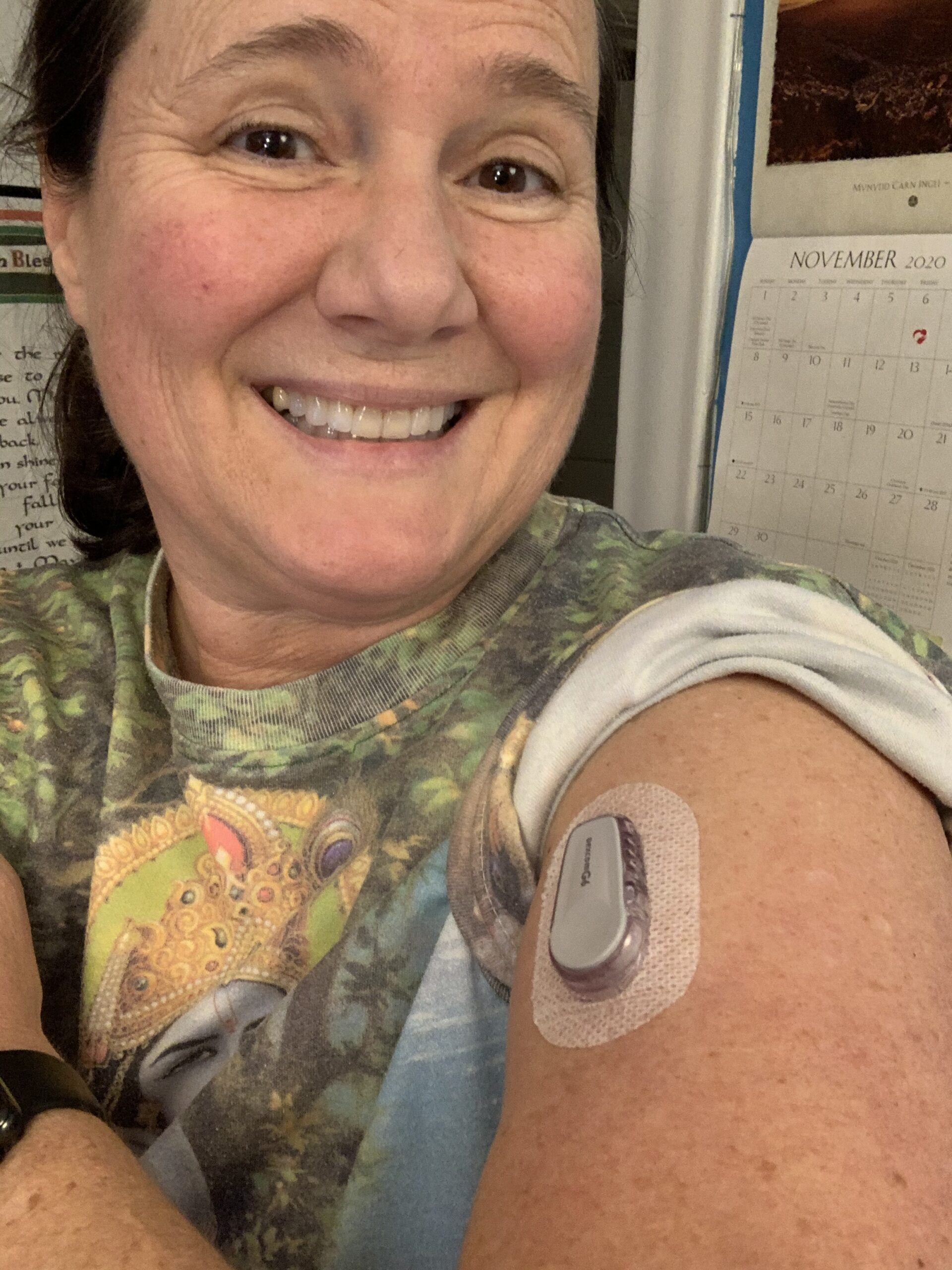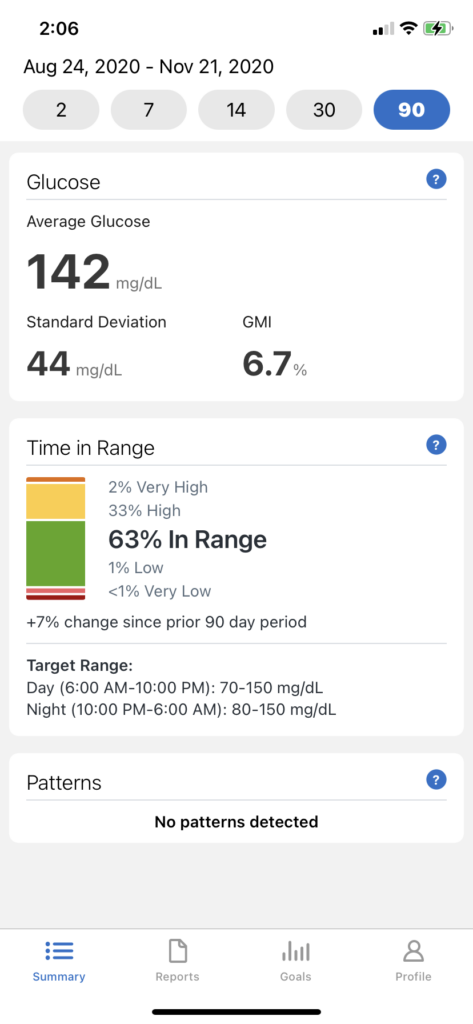
November is Diabetes Awareness Month. I’ve had type 1 diabetes for almost 40 years and as you might imagine, I’ve had quite a few hemoglobin A1c blood tests.
A1c according to Wikipedia wisdom
According to Wikipedia, “A1c is measured primarily to determine the three-month average blood sugar level and can be used as a diagnostic test for diabetes mellitus and as an assessment test for glycemic control in people with diabetes.[4] The test is limited to a three-month average because the average lifespan of a red blood cell is four months. Since individual red blood cells have varying lifespans, the test is used as a limited measure of three months. Normal levels of glucose produce a normal amount of glycated hemoglobin.”
In short, the A1c test ideally measures how well my diabetes management is doing. The thing is, the A1c and me don’t seem to always agree. In my post last week about building more muscle in the body, I mentioned visiting my endocrinologist Rebecca Mattison, MD on November 13th. I also mentioned that according to my continuous glucose monitor (cgm) Dexcom G6 my A1c tracings (name for the graph created by measuring my blood glucose every 5 minutes 24 hours a day, which the Dexcom does) predicted that my A1c should be about 6.7%.
Excellent A1c range
Ideally, an A1c is between 4-6% for someone who doesn’t have diabetes. For someone who has type 1 diabetes, an A1c under 8% is considered good. In the 6’s is better and if possible getting down into the 5’s is super awesome.
Since the start of October, I’ve been paying very close attention to what I’m eating. In addition, I’ve been exercising about 10 hours a week on average. I meditate about an hour every single day. I wear the Dexcom G6 every single day, along with my Tandem t:slim X2 Control-IQ insulin pump. Occasionally I do a blood sugar test with a meter just to check how the Dexcom is doing. It’s always within 10 points, matching perfectly.
I was excited to get this particular A1c result back. Dr. Mattison reminded me that the A1c is just one metric and to not get too hung up on what it might say. I’m glad she said that.
Number hangups

A person with diabetes can get really hung up on the numbers. In fact, it’s very easy to consider yourself a failure if you have diabetes and the A1c comes back high. I’ve battled with the A1c for much of the time I’ve lived with diabetes. When I’m in what I consider to be excellent management phases, my A1c hovers between 7 and 8%. At various points in my life, I’ve gotten extremely stressed out about not being able to get my A1c below 7%.
More than one endocrinologist has told me to relax. Good thing I meditate every day.
My A1c came back as 7.9%. This A1c did NOT match what the Dexcom G6 tracings suggested it would be. Here’s what Dr. Mattison wrote to me:
Something’s not right
“There is something not right and I am not sure what it is. I had the lab rerun the A1c and it came back the same. I am having them check a fructosamine since this is not red blood cell based. You might have been disappointed in your A1c recently because it is not a good reflection with your current body chemistry. I will keep trying to find a reason.”
Here is my reply to Dr. M, “The last time my A1c was so off was both times I had cancer. An A1c of 7.9 right now, when my Dexcom says I’m doing super well, is unfortunately par for the course. A1c and me don’t work well. When I tested my bg with test strips 15-30 times a day to try to figure out the patterns and where I was “going high” to explain my A1c in the high 7’s and 8’s we never found it.
You and Dr. Matt Corcoran are the only two endocrinologists who’ve ever tried to figure out what’s not quite right with me and A1c’s. Matt was baffled when my A1c came back as 9.3 after I had ridden 400 miles on my bike across Colorado and was in the best shape of my life and was eating super clean.
My blood glucose records did not match my A1c at all. That time I had cancer. Oh well. If you can sort out why my A1c doesn’t reflect my actual consistent Dexcom tracings, you ought to get an award!!!! Of note, both times I had cancer I wasn’t surprised. I’m pretty sure I don’t have cancer this time!” NOTE: I found out my mammogram I had this month came back clear. No breast cancer at this moment. Whew.
What device and what number to trust
Dr. M wrote me one more time, “We ran the fructosamine and this would suggest an A1c of ~7.3. I think that we focus on the sensor and as long as it is calibrating well – it is more truthful than any surrogate.”
I took a big deep breath and once again I have let go of trying to achieve a “perfect” A1c. I eat well. I exercise every single day. I meditate every day. My Dexcom tracings are good. There is always room for improvement, and the A1c is not the judge of my value as a human.
The A1c is one method to check on my ability to manage my diabetes. In my case, it doesn’t appear to be the best system to judge myself against. I’m grateful there are additional tools available. Additionally, I am profoundly grateful I have a smart, wise endocrinologist with whom to collaborate on my diabetes management.
Diabetes Awareness Month comes to a close for 2020
It’s the end of November and we’ve made it through another Diabetes Awareness Month. If you have diabetes, well done! If you are friends or family of someone with diabetes, thank you for walking alongside.
It means the world!
How are your A1c’s? I’m interested. Please leave a comment below. Hearing from you makes my day!!
Have you joined my email list? If not, please do! You’ll get a free Self-Care Guide that I made just for you!
I rarely could manage to get an A1c below 7, as an adult (after the first 10 yrs. of my diagnosis, and living far from home).
Do you have any idea what is the physiologic explanation for the difference between A1c and your actual blood glucose average when you had cancer? Reading your post, I got really curious about the reason, and what it means.
Hi Mitra,
They never could explain why my A1c was so high both times I had cancer. I was simply thankful that the high A1c was a warning the second time especially! Yes, some of us seem not to easily get the A1c under 7, try as we might. Grateful it’s not the only measure a good endocrinologist uses to evaluate successful diabetes management.
Thank you, Mari, for documenting these. I am an epidemiologist, so what catches my attention the most in your post was the reason behind high A1c despite good average blood glucose in presence of cancer. When we know the glucose control is good, there is of course no problem diabetes-wise with the high A1c. But it is interesting, or in the case you mentioned vital to know what is the reason behind the deviation. As you mentioned, I could not also find any published explanations about the correlation between the deviation and cancer. Sounds like a perfect research question to work on. This paper is nice in summarizing known factors which may deviate A1c from the average blood glucose: https://www.ncbi.nlm.nih.gov/pmc/articles/PMC3912281/ .
Iron and vitamin B12 deficiency are among them.
Mitra,
Thanks for your insights! I will study the paper you sent along. Very interesting!!! It would indeed be very interesting to study this! I wonder if I have a B12 deficiency. I am mostly vegan. Hmmm, I shall check this out! THANKS!!!
Very welcome! I think it is a good idea to follow it up and hope everythings goes well.
Hi Mari,
I too focus on A1C. When I was super good and exercised (not any where to your extent) my A1C reflected it. Over the past year I have been struggling with being jealous about food and been a bit competitive. I am a Type 1.5 and had been managing with diet and exercise for 10 years. Well – now in year 11 (56 years old) I am on long acting insulin. Before being put on insulin I also did a 3 month period listening to a dietician who told me that veggie carbs don’t matter and my A1C (3 months ago) was the highest in my life at 7.2. I just did a A1c this week and don’t know the results as of yet. I now where the Libre Freestyle and like that I can see what is happening. Diabetes is always a moving target. Be kind to yourself.
Panayota
Panayota,
Thank you for your comment. Diabetes is a constant science experiment that’s for sure. Glad you wear the Libre Freestyle these days! That’s an excellent tool! You are SO correct, being kind to ourselves is essential!!
Virtual hug from afar!
Mari
I’m so sorry you are struggling with this.
I too get very focused on numbers. My A1Cs have been pretty good and steady for 3 years now but sadly my weight keeps going up.
Although at the beginning of the year it stabilized, I have not been so clean with my diet and that would explain the recent 7lb gain.
You eat really well, and exercise a lot. 10 hours a week is excellent.
I wonder if you had considered your sleep patterns. How are those? Sleep is also vital to health. Do you snore? Is there any possibility that you aren’t getting deep enough sleep?
If everything else is coming back in a good range, then don’t sweat the numbers. Just live your healthiest life. You are doing really good for your body. Thanks for continuing to share your story and be an inspiration. ♥️
Thank you Christin for you very kind words. A1c’s are a strange beast. Super glad yours are doing well. Darn about your weight going up. Paying close attention to the food one eats does indeed seem to be a key to weight success, at least for me. Interesting you ask about my sleep. I’ve never done a sleep study, but I’ve wondered if I should. I wake up often in any given night, but I do sleep 8-9 hours most nights. I don’t snore! Or so I’ve been told. Apparently I do breathe very deeply, but none of my sleep mates have classified my deep breathing as snoring. I will ask my endocrinologist about this!! Thanks for reading my blogs!!!